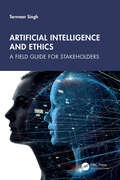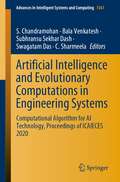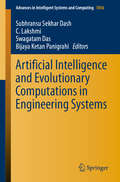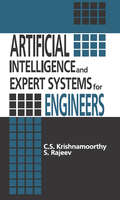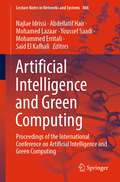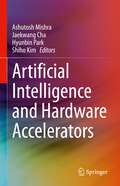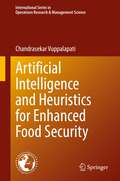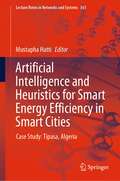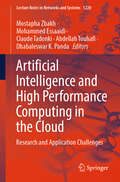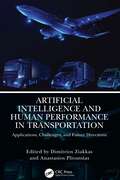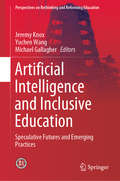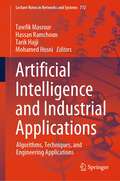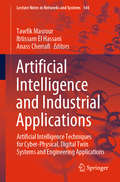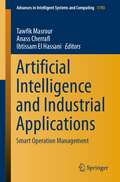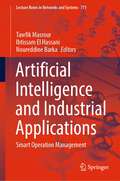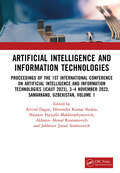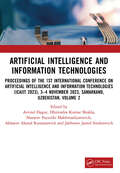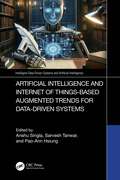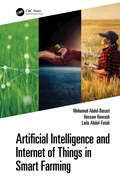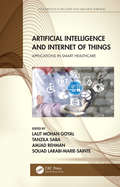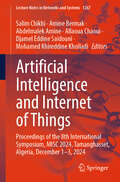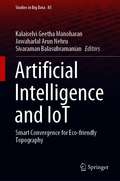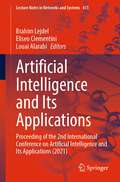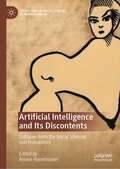- Table View
- List View
Artificial Intelligence and Ethics: A Field Guide for Stakeholders
by Tarnveer SinghArtificial Intelligence and Ethics is a general and wide-ranging survey of the benefits and ethical dilemmas of artificial intelligence (AI). The rise of AI and super-intelligent AI has created an urgent need to understand the many and varied ethical issues surrounding the technologies and applications of AI. This book lays a path towards the benefits and away from potential risks. It includes over thirty short chapters covering the widest array of topics from generative AI to superintelligence, from regulation to transparency, and from cybersecurity to risk management. Written by an award-winning Chief Information Security Officer (CISO) and experienced Technology Leader with two decades of industry experience, the book includes real-life examples and up-to-date references. The book will be of particular interest to business stakeholders, including executives, scientists, ethicists and policymakers, considering the complexities of AI and how to navigate these.
Artificial Intelligence and Evolutionary Computations in Engineering Systems: Computational Algorithm for AI Technology, Proceedings of ICAIECES 2020 (Advances in Intelligent Systems and Computing #1361)
by Swagatam Das Subhransu Sekhar Dash C. Sharmeela S. Chandramohan Bala VenkateshThis book gathers selected papers presented at the 6th International Conference on Artificial Intelligence and Evolutionary Computations in Engineering Systems, held at the Anna University, Chennai, India, from 20 to 22 April 2020. It covers advances and recent developments in various computational intelligence techniques, with an emphasis on the design of communication systems. In addition, it shares valuable insights into advanced computational methodologies such as neural networks, fuzzy systems, evolutionary algorithms, hybrid intelligent systems, uncertain reasoning techniques, and other machine learning methods and their application to decision-making and problem-solving in mobile and wireless communication networks.
Artificial Intelligence and Evolutionary Computations in Engineering Systems: Proceedings Of Icaieces 2015 (Advances in Intelligent Systems and Computing #1056)
by Bijaya Ketan Panigrahi Swagatam Das Subhransu Sekhar Dash C. LakshmiThis book gathers selected papers presented at the 4th International Conference on Artificial Intelligence and Evolutionary Computations in Engineering Systems, held at the SRM Institute of Science and Technology, Kattankulathur, Chennai, India, from 11 to 13 April 2019. It covers advances and recent developments in various computational intelligence techniques, with an emphasis on the design of communication systems. In addition, it shares valuable insights into advanced computational methodologies such as neural networks, fuzzy systems, evolutionary algorithms, hybrid intelligent systems, uncertain reasoning techniques, and other machine learning methods and their application to decision-making and problem-solving in mobile and wireless communication networks.
Artificial Intelligence and Expert Systems for Engineers (New Directions in Civil Engineering #11)
by C. S. Krishnamoorthy S. RajeevThis book provides a comprehensive presentation of artificial intelligence (AI) methodologies and tools valuable for solving a wide spectrum of engineering problems. What's more, it offers these AI tools on an accompanying disk with easy-to-use software. Artificial Intelligence and Expert Systems for Engineers details the AI-based methodologies known as: Knowledge-Based Expert Systems (KBES); Design Synthesis; Design Critiquing; and Case-Based Reasoning. KBES are the most popular AI-based tools and have been successfully applied to planning, diagnosis, classification, monitoring, and design problems. Case studies are provided with problems in engineering design for better understanding of the problem-solving models using the four methodologies in an integrated software environment. Throughout the book, examples are given so that students and engineers can acquire skills in the use of AI-based methodologies for application to practical problems ranging from diagnosis to planning, design, and construction and manufacturing in various disciplines of engineering.Artificial Intelligence and Expert Systems for Engineers is a must-have reference for students, teachers, research scholars, and professionals working in the area of civil engineering design in particular and engineering design in general.
Artificial Intelligence and Green Computing: Proceedings of the International Conference on Artificial Intelligence and Green Computing (Lecture Notes in Networks and Systems #806)
by Mohamed Lazaar Najlae Idrissi Abdellatif Hair Youssef Saadi Mohammed Erritali Said El KafhaliThe main objective of this book is to explore the synergy between cutting-edge AI technologies and environmentally conscious practices through collecting best selected research papers presented at the International Conference on Artificial Intelligence and Green Computing (ICAIGC 2023), which took place from March 15 to 17, 2023, in Beni Mellal, Morocco. Within the pages of this book, readers find a wealth of research findings, survey works, and practical experiences aimed at fostering a comprehensive understanding of the pivotal role AI plays in various fields, including agriculture, health care, IT, and more. It highlights both the opportunities presented by the widespread usage of AI and the challenges associated with its continued advancement. As a result, the book has been divided into three parts: 1)- AI for multimedia processing, 2)- AI for distributed computing, and 3)- AI applications. The book serves as a comprehensive resource that brings together on-going research and practical experiences from the ICAIGC 2023 conference. It strives to deepen the understanding of the essential role AI plays in multiple fields. Whether you are an AI enthusiast, researcher, or practitioner, the insights contained within these pages expand your horizons and inspire further exploration of AI's potential in shaping a greener and more technologically advanced future.
Artificial Intelligence and Hardware Accelerators
by Ashutosh Mishra Shiho Kim Jaekwang Cha Hyunbin ParkThis book explores new methods, architectures, tools, and algorithms for Artificial Intelligence Hardware Accelerators. The authors have structured the material to simplify readers’ journey toward understanding the aspects of designing hardware accelerators, complex AI algorithms, and their computational requirements, along with the multifaceted applications. Coverage focuses broadly on the hardware aspects of training, inference, mobile devices, and autonomous vehicles (AVs) based AI accelerators
Artificial Intelligence and Heuristics for Enhanced Food Security (International Series in Operations Research & Management Science #331)
by Chandrasekar VuppalapatiThis book introduces readers to advanced data science techniques for signal mining in connection with agriculture. It shows how to apply heuristic modeling to improve farm-level efficiency, and how to use sensors and data intelligence to provide closed-loop feedback, while also providing recommendation techniques that yield actionable insights. The book also proposes certain macroeconomic pricing models, which data-mine macroeconomic signals and the influence of global economic trends on small-farm sustainability to provide actionable insights to farmers, helping them avoid financial disasters due to recurrent economic crises. The book is intended to equip current and future software engineering teams and operations research experts with the skills and tools they need in order to fully utilize advanced data science, artificial intelligence, heuristics, and economic models to develop software capabilities that help to achieve sustained food security for future generations.
Artificial Intelligence and Heuristics for Smart Energy Efficiency in Smart Cities: Case Study: Tipasa, Algeria (Lecture Notes in Networks and Systems #361)
by Mustapha HattiThis book emphasizes the role of micro-grid systems and connected networks for the strategic storage of energy through the use of information and communication techniques, big data, the cloud, and meta-heuristics to support the greed for artificial intelligence techniques in data and the implementation of global strategies to meet the challenges of the city in the broad sense. The intelligent management of renewable energy in the context of the energy transition requires the use of techniques and tools based on artificial intelligence (AI) to overcome the challenges of the intermittence of resources and the cost of energy. The advent of the smart city makes an increased call for the integration of artificial intelligence and heuristics to meet the challenge of the increasing migration of populations to the city, in order to ensure food, energy, and environmental security of the citizen of the city and his well-being. This book is intended for policymakers, academics, practitioners, and students. Several real cases are exposed throughout the book to illustrate the concepts and methods of the networks and systems presented. This book proposes the development of new technological innovations—mainly ICT—the concept of “Smart City” appears as a means of achieving more efficient and sustainable cities. The overall goal of the book is to develop a comprehensive framework to help public and private stakeholders make informed decisions on smart city investment strategies and develop skills for assessment and prioritization, including resolution of difficulties with deployment and reproducibility.
Artificial Intelligence and High Performance Computing in the Cloud: Research and Application Challenges (Lecture Notes in Networks and Systems #1220)
by Mostapha Zbakh Mohammed Essaaidi Dhabaleswar K. Panda Abdellah Touhafi Claude TadonkiHigh-performance computing as significantly evolves during the last two decades with the advent and consideration of multicores configurations and general-purpose GPUs. In the same time but more recently, artificial intelligence has gained a serious popularity and is considered in a broad range of applications. Cutting-edge AI, which typically involving large models and huge volume of training datasets, cannot be considered without the support of HPC infrastructures and techniques. Cloud computing is the most affordable way to leverage the power of HPC systems. As collection of valuable inputs from high-standard scientists, “Artificial Intelligence and High-Performance Computing in the Cloud: Upcoming” is certainly a book that should be given a serious consideration.
Artificial Intelligence and Human Performance in Transportation: Applications, Challenges, and Future Directions
by Dimitrios Ziakkas Anastasios PlioutsiasArtificial Intelligence (AI) is a major technological advancement in the 21st century. With its influence spreading to all aspects of our lives and the engineering sector, establishing well-defined objectives is crucial for successfully integrating AI in the field of transportation. This book presents different ways of adopting emerging technologies in transportation operations, including security, safety, online training, and autonomous vehicle operations on land, sea, and air.This guide is a dynamic resource for senior management and decision-makers, with essential practical advice distilled from the expertise of specialists in the field. It addresses the most critical issues facing transportation service providers in adopting AI and investigates the relationship between the human operator and the technology to navigate what is and is not feasible or impossible. Case studies of actual implementation provide context to common scenarios in the transportation sector.This book will serve the reader as the starting point for practical questions regarding the deployment and safety assurance of new and emergent technologies in the transportation domains. Artificial Intelligence and Human Performance in Transportation is a beneficial read for professionals in the fields of Human Factors, Engineering (Aviation, Maritime and Land), Logistics, Manufacturing, Accident Investigation and Safety, Cybersecurity and Human Resources.
Artificial Intelligence and Inclusive Education: Speculative Futures and Emerging Practices (Perspectives on Rethinking and Reforming Education)
by Michael Gallagher Jeremy Knox Yuchen WangThis book brings together the fields of artificial intelligence (often known as A.I.) and inclusive education in order to speculate on the future of teaching and learning in increasingly diverse social, cultural, emotional, and linguistic educational contexts. This book addresses a pressing need to understand how future educational practices can promote equity and equality, while at the same time adopting A.I. systems that are oriented towards automation, standardisation and efficiency. The contributions in this edited volume appeal to scholars and students with an interest in forming a critical understanding of the development of A.I. for education, as well as an interest in how the processes of inclusive education might be shaped by future technologies. Grounded in theoretical engagement, establishing key challenges for future practice, and outlining the latest research, this book offers a comprehensive overview of the complex issues arising from the convergence of A.I. technologies and the necessity of developing inclusive teaching and learning.To date, there has been little in the way of direct association between research and practice in these domains: A.I. has been a predominantly technical field of research and development, and while intelligent computer systems and ‘smart’ software are being increasingly applied in many areas of industry, economics, social life, and education itself, a specific engagement with the agenda of inclusion appears lacking. Although such technology offers exciting possibilities for education, including software that is designed to ‘personalise’ learning or adapt to learner behaviours, these developments are accompanied by growing concerns about the in-built biases involved in machine learning techniques driven by ‘big data’.
Artificial Intelligence and Industrial Applications: Algorithms, Techniques, and Engineering Applications (Lecture Notes in Networks and Systems #772)
by Tawfik Masrour Hassan Ramchoun Tarik Hajji Mohamed HosniAmid the dynamic growth of artificial intelligence, this book presents a collection of findings and advancements from the second edition of the A2IA-Artificial Intelligence and Industrial Applications conference. The conference, hosted by ENSAM-Meknès at Moulay Ismail University, Morocco, fosters knowledge exchange in AI, focusing primarily on its industrial applications. Covering a wide range of topics, the book highlights the adaptable nature of AI and its increasing impact on industrial sectors. It brings together contributions from an international cohort of researchers, discussing themes such as intelligent manufacturing and maintenance, intelligent supply chain management, various modes of learning including supervised, unsupervised, reinforcement, semi-supervised, and graph-based, as well as neural networks, deep learning, planning, and optimization. A defining feature of this edition is its extensive scope and emphasis on the practical applications of AI, along with its foundational elements. It facilitates an understanding of AI's current state and potential future direction, showcasing recent developments that bridge the gap between theory and practice. Designed for a diverse readership, this book is of interest to AI practitioners, academics, and enthusiasts, as well as to those new to the field. It provides an opportunity to explore AI's critical role in industrial applications, and the practical insights it offers are likely to be beneficial for decision-making within industrial settings.
Artificial Intelligence and Industrial Applications: Artificial Intelligence Techniques for Cyber-Physical, Digital Twin Systems and Engineering Applications (Lecture Notes in Networks and Systems #144)
by Tawfik Masrour Ibtissam El Hassani Anass CherrafiThis book gathers selected papers from Artificial Intelligence and Industrial Applications (A2IA’2020), the first installment of an annual international conference organized by ENSAM-Meknes at Moulay Ismail University, Morocco. The 29 papers presented here were carefully reviewed and selected from 141 submissions by an international scientific committee. They address various aspects of artificial intelligence such as digital twin, multiagent systems, deep learning, image processing and analysis, control, prediction, modeling, optimization and design, as well as AI applications in industry, health, energy, agriculture, and education. The book is intended for AI experts, offering them a valuable overview and global outlook for the future, and highlights a wealth of innovative ideas and recent, important advances in AI applications, both of a foundational and practical nature. It will also appeal to non-experts who are curious about this timely and important subject.
Artificial Intelligence and Industrial Applications: Smart Operation Management (Advances in Intelligent Systems and Computing #1193)
by Tawfik Masrour Ibtissam El Hassani Anass CherrafiThis book gathers the refereed proceedings of the Artificial Intelligence and Industrial Applications (A2IA’2020), the first installment of an annual international conference organized by the ENSAM-Meknes at Moulay Ismail University, Morocco. The 30 papers presented here were carefully reviewed and selected from 141 submissions by an international scientific committee. They address various aspects of artificial intelligence such as smart manufacturing, smart maintenance, smart supply chain management, supervised learning, unsupervised learning, reinforcement learning, graph-based and semi-supervised learning, neural networks, deep learning, planning and optimization, and other AI applications. The book is intended for AI experts, offering them a valuable overview of the status quo and a global outlook for the future, with many new and innovative ideas and recent important developments in AI applications, both of a foundational and practical nature. It will also appeal to non-experts who are curious about this timely and important subject.
Artificial Intelligence and Industrial Applications: Smart Operation Management (Lecture Notes in Networks and Systems #771)
by Tawfik Masrour Ibtissam El Hassani Noureddine BarkaAmid the dynamic growth of artificial intelligence, this book presents a collection of findings and advancements from the second edition of the A2IA-Artificial Intelligence and Industrial Applications conference. The conference, hosted by ENSAM-Meknès at Moulay Ismail University, Morocco, fosters knowledge exchange in AI, focusing primarily on its industrial applications.Covering a wide range of topics, the book highlights the adaptable nature of AI and its increasing impact on industrial sectors. It brings together contributions from an international cohort of researchers, discussing themes such as intelligent manufacturing and maintenance, intelligent supply chain management, various modes of learning including supervised, unsupervised, reinforcement, semi-supervised, and graph-based, as well as neural networks, deep learning, planning, and optimization.A defining feature of this edition is its extensive scope and emphasis on the practical applications of AI, along with its foundational elements. It facilitates an understanding of AI's current state and potential future direction, showcasing recent developments that bridge the gap between theory and practice.Designed for a diverse readership, this book is of interest to AI practitioners, academics, and enthusiasts, as well as to those new to the field. It provides an opportunity to explore AI's critical role in industrial applications, and the practical insights it offers are likely to be beneficial for decision-making within industrial settings.
Artificial Intelligence and Information Technologies: Proceedings of the 1st International Conference on Artificial Intelligence and Information Technologies (ICAIIT 2023), 3–4 November 2023, Samarkand, Uzbekistan, Volume 1
by Arvind Dagur Dhirendra Kumar Shukla Nazarov Fayzullo Makhmadiyarovich Akhatov Akmal Rustamovich Jabborov Jamol SindorovichThis book contains the proceedings of a non-profit conference with the objective of providing a platform for academicians, researchers, scholars and students from various institutions, universities and industries in India and abroad, and exchanging their research and innovative ideas in the field of Artificial Intelligence and Information Technologies.It begins with exploring the research and innovation in the field of Artificial Intelligence and Information Technologies including secure transaction, monitoring, real time assistance and security for advanced stage learners, researchers and academicians has been presented. It goes on to cover: Broad knowledge and research trends about artificial intelligence and Information Technologies and their role in today’s digital era. Depiction of system model and architecture for clear picture of AI in real life. Discussion on the role of Artificial Intelligence in various real-life problems such as banking, healthcare, navigation, communication, security, etc. Explanation of the challenges and opportunities in AI based Healthcare, education, banking, and related Industries. Recent Information technologies and challenges in this new epoch. This book will be beneficial to researchers, academicians, undergraduate students, postgraduate students, research scholars, professionals, technologists and entrepreneurs.
Artificial Intelligence and Information Technologies: Proceedings of the 1st International Conference on Artificial Intelligence and Information Technologies (ICAIIT 2023), 3–4 November 2023, Samarkand, Uzbekistan, Volume 2
by Arvind Dagur Dhirendra Kumar Shukla Nazarov Fayzullo Makhmadiyarovich Akhatov Akmal Rustamovich Jabborov Jamol SindorovichThis book contains the proceedings of a non-profit conference with the objective of providing a platform for academicians, researchers, scholars and students from various institutions, universities and industries in India and abroad, and exchanging their research and innovative ideas in the field of Artificial Intelligence and Information Technologies.It begins with exploring the research and innovation in the field of Artificial Intelligence and Information Technologies including secure transaction, monitoring, real time assistance and security for advanced stage learners, researchers and academicians has been presented. It goes on to cover: Broad knowledge and research trends about artificial intelligence and Information Technologies and their role in today’s digital era. Depiction of system model and architecture for clear picture of AI in real life. Discussion on the role of Artificial Intelligence in various real-life problems such as banking, healthcare, navigation, communication, security, etc. Explanation of the challenges and opportunities in AI based Healthcare, education, banking, and related Industries. Recent Information technologies and challenges in this new epoch. This book will be beneficial to researchers, academicians, undergraduate students, postgraduate students, research scholars, professionals, technologists and entrepreneurs.
Artificial Intelligence and Internet of Things based Augmented Trends for Data Driven Systems (Intelligent Data-Driven Systems and Artificial Intelligence)
by Pao-Ann Hsiung Sarvesh Tanwar Anshu SinglaThis book comprehensively discusses the role of cloud computing in artificial intelligence‑based data‑driven systems and hybrid cloud computing for large data‑driven applications. It further explores new approaches, paradigms, and frameworks to meet societal challenges by providing solutions for critical insights into data. The text provides Internet of Things‑based frameworks and advanced computing techniques to deal with online/virtual systems.This book:• Covers the aspects of security, authentication, and prediction for data‑driven systems in heterogeneous environments.• Provides data‑driven frameworks in combination with the Internet of Things, artificial intelligence, and computing to provide critical insights and decision‑making for real‑time problems.• Showcases deep learning‑based computer vision algorithms for enhanced pattern detection in different domains based on data‑centric approaches.• Examines the role of the Internet of Things and machine learning algorithms for data‑driven systems.• Highlights the applications of data‑driven systems and cloud computing in enhancing network performance.This book is primarily written for senior undergraduates, graduate students, and academic researchers in diverse fields including electrical engineering, electronics and communications engineering, and computer science engineering.
Artificial Intelligence and Internet of Things in Smart Farming
by Mohamed Abdel-Basset Hossam Hawash Laila Abdel-FatahThis book provides a broad overview of the areas of artificial intelligence (AI) that can be used for smart farming applications, through either successful engineering or ground-breaking research. Among them, the highlighted tactics are soil management, water management, crop management, livestock management, harvesting, and the integration of Internet of Things (IoT) in smart farming.Artificial Intelligence and Internet of Things in Smart Farming explores different types of smart framing systems for achieving sustainability goals in the real environment. The authors discuss the benefits of smart harvesting systems over traditional harvesting methods, including decreased labor requirements, increased crop yields, increased probabilities of successful harvests, enhanced visibility into crop health, and lower overall harvest and production costs. It explains and describes big data in terms of its potential five dimensions—volume, velocity, variety, veracity, and valuation—within the framework of smart farming. The authors also discuss the recent IoT technologies, such as fifth-generation networks, blockchain, and digital twining, to improve the sustainability and productivity of smart farming systems. The book identifies numerous issues that call for conceptual innovation and has the potential to progress machine learning (ML), resulting in significant impacts. As an illustration, the authors point out how smart farming offers an intriguing field for interpretable ML. The book then delves into the function of AI techniques, such as AI in accelerating the development of nano-enabled agriculture, thereby facilitating safe-by-design nanomaterials for various consumer products and medical applications.This book is for undergraduate students, graduate students, researchers, and AI engineers who pursue a strong understanding of the practical methods of machine learning in the agriculture domain. Practitioners and stakeholders would be able to follow this book to understand the potential of ML in their farming projects and agricultural solutions.Features:• Explores different types of smart framing systems for achieving sustainability goals in the real environment • Explores ML-based analytics such as generative adversarial networks (GAN), autoencoders, computational imaging, and quantum computing • Examines the development of intelligent machines to provide solutions to real-world problems, emphasizing smart farming applications, which are not modeled or are extremely difficult to model mathematically • Emphasizes methods for better managing crops, soils, water, and livestock, urging investors and businesspeople to occupy the existing vacant market area • Discusses AI-empowered Nanotechnology for smart farming
Artificial Intelligence and Internet of Things: Applications in Smart Healthcare (Innovations in Big Data and Machine Learning)
by Lalit Mohan GoyalThis book reveals the applications of AI and IoT in smart healthcare and medical systems. It provides core principles, algorithms, protocols, emerging trends, security problems, and the latest e-healthcare services findings.The book also provides case studies and discusses how AI and IoT applications such as wireless devices, sensors, and deep learning could play a major role in assisting patients, doctors, and pharmaceutical staff. It focuses on how to use AI and IoT to keep patients safe and healthy and, at the same time, empower physicians to deliver superlative care.This book is written for researchers and practitioners working in the information technology, computer science, and medical equipment manufacturing industry for products and services having basic- and high-level AI and IoT applications. The book is also a useful guide for academic researchers and students.
Artificial Intelligence and Internet of Things: Proceedings of the 8th International Symposium, MISC 2024, Tamanghasset, Algeria, December 1-3, 2024 (Lecture Notes in Networks and Systems #1267)
by Salim Chikhi Abdelmalek Amine Allaoua Chaoui Mohamed Khireddine Kholladi Djamel Eddine Saidouni Amine BermakThis book offers a cutting-edge exploration of key advancements in artificial intelligence, IoT, data science, and their transformative impact on industries, particularly health care, in a rapidly evolving technological landscape. Readers will discover how AI and machine learning drive innovations, from detecting anomalies in satellite systems to enhancing medical diagnostics and treatment precision. With a focus on real-world applications, the book delves into the integration of IoT systems and cloud computing to streamline business operations and improve efficiency. It also introduces groundbreaking data science techniques for analysis and prediction, making it a valuable resource for professionals, researchers, and students. Designed for those looking to understand and harness the power of modern technology, this book provides insights that are both practical and forward-looking, equipping readers to address today’s challenges and shape the future.
Artificial Intelligence and IoT: Smart Convergence for Eco-friendly Topography (Studies in Big Data #85)
by Kalaiselvi Geetha Manoharan Jawaharlal Arun Nehru Sivaraman BalasubramanianThis book projects a futuristic scenario that is more existent than they have been at any time earlier. To be conscious of the bursting prospective of IoT, it has to be amalgamated with AI technologies. Predictive and advanced analysis can be made based on the data collected, discovered and analyzed. To achieve all these compatibility, complexity, legal and ethical issues arise due to automation of connected components and gadgets of widespread companies across the globe. While these are a few examples of issues, the authors’ intention in editing this book is to offer concepts of integrating AI with IoT in a precise and clear manner to the research community. In editing this book, the authors’ attempt is to provide novel advances and applications to address the challenge of continually discovering patterns for IoT by covering various aspects of implementing AI techniques to make IoT solutions smarter. The only way to remain pace with this data generated by the IoT and acquire the concealed acquaintance it encloses is to employ AI as the eventual catalyst for IoT. IoT together with AI is more than an inclination or existence; it will develop into a paradigm. It helps those researchers who have an interest in this field to keep insight into different concepts and their importance for applications in real life. This has been done to make the edited book more flexible and to stimulate further interest in topics. All these motivated the authors toward integrating AI in achieving smarter IoT. The authors believe that their effort can make this collection interesting and highly attract the student pursuing pre-research, research and even master in multidisciplinary domain.
Artificial Intelligence and Its Applications: Proceeding of the 2nd International Conference on Artificial Intelligence and Its Applications (2021) (Lecture Notes in Networks and Systems #413)
by Eliseo Clementini Brahim Lejdel Louai AlarabiThis book contains the proceedings of the second edition of the international Conference on Artificial Intelligence and its Applications (AIAP'21). This edition aims to bring together leading academic scientists, international researchers, and practitioners to exchange and share their experiences and research results on all aspects of Artificial Intelligence. It also provides an interdisciplinary platform for researchers, practitioners and students to present and discuss the most recent innovations, trends, and concerns as well as practical challenges encountered and solutions adopted in the fields of Artificial Intelligence. This international conference offers an opportunity to bridge the gap between the Artificial Intelligence research community and people from the industry or working in other research areas including smart cities, big data, cloud computing, social networks, and energy.
Artificial Intelligence and Its Contexts: Security, Business and Governance (Advanced Sciences and Technologies for Security Applications)
by Anna Visvizi Marek BodzianyThis book offers a comprehensive approach to the question of how artificial intelligence (AI) impacts politics, economy, and the society today. In this view, it is quintessential for understanding the complex nature of AI and its role in today’s world. The book has been divided into three parts. Part one is devoted to the question of how AI will be used for security and defense purposes, including combat in war zones. Part two looks at the value added of AI and machine learning for decision-making in the fields of politics and business. Part three consists of case studies—covering the EU, the USA, Saudi Arabia, Portugal, and Poland—that discuss how AI is being used in the realms of politics, security and defense. The discussion in the book opens with the question of the nature of AI, as well as of ethics and the use of AI in combat. Subsequently, the argument covers issues as diverse as the militarization of AI, the use of AI in strategic studies and military strategy design. These topics are followed by an insight into AI and strategic communication (StratCom), including disinformation, as well as into AI and finance. The case-studies included in part 3 of the book offer a captivating overview of how AI is being employed to stimulate growth and development, to promote data- and evidence-driven policy-making, to enable efficient and inclusive digital transformation and other related issues. Written by academics and practitioners in an academically sound, yet approachable manner, this volume queries issues and topics that form the thrust of processes that transform world politics, economics and society. As such, this volume will serve as the primer for students, researchers, lectures and other professionals who seek to understand and engage with the variety of issues AI implicates.
Artificial Intelligence and Its Discontents: Critiques from the Social Sciences and Humanities (Social and Cultural Studies of Robots and AI)
by Ariane HanemaayerOn what basis can we challenge Artificial Intelligence (AI) - its infusion, investment, and implementation across the globe? This book answers this question by drawing on a range of critical approaches from the social sciences and humanities, including posthumanism, ethics and human values, surveillance studies, Black feminism, and other strategies for social and political resistance. The authors analyse timely topics, including bias and language processing, responsibility and machine learning, COVID-19 and AI in health technologies, bio-AI and nanotechnology, digital ethics, AI and the gig economy, representations of AI in literature and culture, and many more. This book is for those who are currently working in the field of AI critique and disruption as well as in AI development and programming. It is also for those who want to learn more about how to doubt, question, challenge, reject, reform and otherwise reprise AI as it been practiced and promoted.
